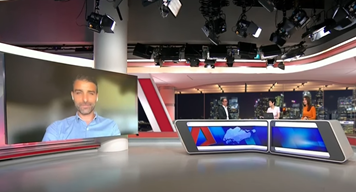The sky is no limit for founder of home-grown space tech company
First published on The Straits Times Online, 24 August 2020

NIE's higher degree programme led physicist, Dr Mark Lim, to pursue new frontiers in research and entrepreneurship. Furthering his studies took Dr Lim, CEO of Aliena, places. PHOTO: TONY LEUNG T. K.
At 32, Dr Mark Lim is the chief executive officer of Aliena, a home-grown space tech company that develops ultra-low power electric propulsion systems, or novel engines, for small satellites.
Among other things, these engines enable satellites to perform manoeuvres that can give clearer insights into Earth’s natural disasters, which will then allow organisations to better plan for humanitarian aid and rescue missions.
As a CEO, his typical work day starts at 6am. He drives his wife, a teacher, to work before heading to his office. During the long commute from his residence in the west to his office in the east, he listens to podcasts to keep abreast of current affairs. Once he reaches the office, he spends some time reading scientific journals before his staff reports for work.
Once his staff comes in, he begins work by meeting the science and engineering division, which keeps him up-to-date with the work that the division’s research and development (R&D) team is pursuing. After that, he turns his attention to project proposals and communicating with Aliena’s stakeholders, partners and clients. On some days, he heads out for external meetings.
Due to his busy schedule, he often finds himself eating lunch at his desk while reading progress reports about the company’s range of projects and experiments. When he has time, he swings by the laboratories to assist the in-house scientists with troubleshooting, where necessary.
After all, Dr Lim himself specialises in plasma physics. He graduated from the Doctor of Philosophy (PhD) programme in 2018 with the Natural Sciences and Science Education (NSSE) Academic Group at the National Institute of Education, Nanyang Technological University, Singapore (NIE NTU, Singapore).
NIE PAVES THE WAY
Dr Lim developed a strong interest in plasma physics and its applications during the final year of his undergraduate programme at NTU. He dived deep into the subject matter when he furthered his studies. Dr Lim says: "I spent the final year of my undergraduate final-year project working on materials and followed up to pursue my higher degree in materials processing. I spent the earlier part of my PhD working on materials, and later expanded my interest in other domains such as medicine and space."
Also known as the fourth phase of matter, plasma in plasma physics, according to encyclopaedia Britannica, refers to “an electrically conducting medium in which there are roughly equal numbers of positively and negatively charged particles, produced when the atoms in a gas become ionised”.
Apart from space propulsion technology, plasma physics can be applied in the fabrication of advanced opto-electronic materials used in devices such as solar cells and LEDs, protective coatings for optical materials and bio-nanomaterials used in medicine and cancer treatment.

Dr Mark Lim and Dr Matteo Laterza, Aliena's lead propulsion scientist, are seen test firing one of Aliena's satellite engines. PHOTO: TONY LEUNG T.K.
His motivation to start his own space tech company came after he worked with colleagues on various commercial-scale projects at the Energy Research Institute @NTU (ERI@N) during his PhD. This was where he met his co-founders at Aliena.
“As a hardcore evangelist of plasma engineering in industrial applications, I recall telling my colleagues, now my co-founders, that there was so much more we could do with plasma sources — including in fields such as biomedical sciences, materials processing and even space propulsion,” explains Dr Lim.
He began his business right after earning his PhD degree, with support from investors including Paspalis, the leading privately owned investment company in the Australian Northern Territory, Silicon Valley-based venture capital firm 500 Startups, and Cap Vista, the strategic investment arm of the Defence Science and Technology Agency.
On top of his work at Aliena, he continues his passion in science as a principal investigator at ERI@N, where he focuses on researching advanced emerging energy generation systems.
Dr Lim says: “My training as a research student allowed me to hone my craft in understanding and developing plasma sources for various applications. Through it, I understood constraints and challenges in the design and development of miniature systems and developed a good acumen through a deep understanding of the physics involved to work on the systems I am working on today.”
SUPPORT NETWORK AND COLLABORATION WITH FELLOW SCIENTISTS
The road to higher learning and starting his own business is not an easy path. Prior to his PhD in NIE, he enrolled in a part-time master’s programme in plasma physics at NTU while teaching physics at Dunman High School.
Dr Lim was offered to convert his candidature from his master’s programme to the PhD programme at NIE because of his research work on plasma.
“I was also extremely fortunate to have been supported by a scholarship that allowed me to pursue my PhD full time. The support from the scholarship allowed me to further hone my craft and diversify my research through exploration into various verticals in tandem, allowing for me to publish widely and in various domains,” he says.

Dr Mark Lim speaks to the crowd of Moongazers, a special event at ArtScience Museum Singapore that celebrated the 50th anniversary of the Apollo 11 landing on the moon in July 2019. He led the discussion about Aliena and NTU's work to bring Singapore's first satellite to the moon. PHOTO: ARTSCIENCE MUSEUM SINGAPORE
His articles on plasma physics have also been published in leading scientific journals like Materials Horizons, Plasma Sources Science and Technology, and Physics of Plasmas.
For Dr Lim, higher learning meant sacrificing other things in life that people would normally take for granted, like watching TV. But he found comfort in knowing that pursuing higher learning would help boost his professional development.
“This was an important point in my life where I learnt to make up for giving up such minor indulgences by fully occupying every moment I have in my day and making it extremely productive,” he explains.
His PhD days at NIE have taught him to “work hard and work smart” in order to fully utilise his time for maximum productivity.
He says: “Being in NIE helped me to deepen my expertise in a niche field, but at the same time, it also allowed for me to work collaboratively with various researchers in adjacent domains.”
For professionals considering pursuing higher education, Dr Lim has this piece of advice: “Go for it! I truly believe that lifelong learning is a virtue that future-ready citizens should possess. This would allow us to remain competitive, relevant and employable even as technology springboards in an age where disruptive innovation catalyses change in various industries.
“The world is evolving too quickly, and it is important for globally relevant citizens to consider furthering interests and passions both deeply and broadly. NIE would be the perfect place to do that, with the infrastructure and facilities to accommodate learning and cutting-edge research, a knowledgeable and reputable faculty that has deep expert domain knowledge, and a broad inter-disciplinary environment with a group of learners from diverse backgrounds that would facilitate meaningful discussions and reinforced learning.”







